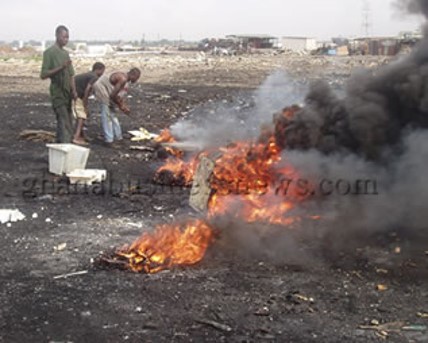UN expert says toxics exposures in Ghana human rights violations
 Ghana has come under the spotlight of a UN expert over the cases of citizens being exposed to toxic substances.
Ghana has come under the spotlight of a UN expert over the cases of citizens being exposed to toxic substances.
The UN Special Rapporteur on toxics and human rights, Marcos Orellana who visited Ghana for 14 days has urged the government to take urgent action to deal with the threats posed to citizens by toxic substances.
He said there is an urgent need for Ghana to respect and guarantee the free and full exercise of human rights.
In commending Ghana for its leadership at the international level in strengthening multilateral agreements in the chemicals and waste cluster, where Ghana is also leading the African Group in negotiations toward a legally binding agreement on plastic pollution, he noted that, earlier this year, Ghana proposed landmark amendments to the Basel Convention on the Control of Transboundary Movements of Hazardous Wastes and their Disposal, in order to subject transboundary movements of e-wastes to the prior informed consent procedure of the Convention.
“Similarly, Ghana is co-sponsoring an amendment to the Rotterdam Convention on the Prior Informed Consent Procedure for Certain Hazardous Chemicals and Pesticides in International Trade, to be discussed in the next Conference of the Parties, to establish a new Annex for the listing of hazardous chemicals where consensus cannot be reached at the COP, in order to overcome the paralysis that has undermined the effectiveness of this instrument.
Furthermore, Ghana has taken the lead in the process toward a new legally binding instrument on plastic pollution, including incorporating elements of a rights-based approach. It is also encouraging to see Ghana lead on the elaboration of an action plan on chemicals and waste for the sub-region at ECOWAS,” he said.
However, the Special Rapporteur on toxics and human rights said: “At the same time, there is weak implementation of laws concerning chemicals and wastes at the national level. This puts individuals at risk of serious human rights violations.”
Orellana said the toxic impacts of mercury use in small-scale gold mining, hazardous pesticides, plastics and e-waste exposures are particularly concerning.
“Ghana is on the receiving end of a global economy that seeks to externalise the costs of waste generation on poor developing countries. The result is exposure of workers lacking protective equipment to the hazardous substances released in the dismantling and recycling of e-wastes,” he said.
Citing Agbogbloshie, one of the world’s largest e-waste dumpsites, where thousands of people living and working there are exposed to high levels of hazardous substances, he said, “For a meagre income, children are leaving their schools to burn electronic cables for the extraction of copper.
“Mercury use in small-scale mining is contaminating soils and water sources at a national scale, compromising the rights of present and future generations,” he said.
He said the government’s National Action Plan on mercury is an important step but is not ambitious enough and does not include a phase-out date for mercury use.
“The government should ban the trade and use in mercury, champion amendments to strengthen the Minamata Convention on mercury, and address mercury use as a form of environmental crime,” he said.
He pointed out that plastic waste also is not properly managed.
“Plastics are covering beaches and burning in informal dumpsites all over the country. The National Plastic Waste Management Policy is important but effective implementation is lacking.
“For instance, Ghana should consider banning single-use plastics, reducing volumes of production and establishing extended producer responsibility schemes,” he said.
He noted further that several of the pesticides used in Ghana, such as paraquat and chlorpyrifos, are banned for use in Europe because they are hazardous to human health and the environment.
“It is also alarming that one of the most widely used pesticides in the country is glyphosate, which is ‘probably carcinogenic to humans’, according to the International Agency for Research on Cancer,” he added.
“I want to highlight the abhorrent double standards of countries that ban dangerous pesticides while allowing them to be produced and exported to developing countries. But Ghana also has a responsibility to protect the human rights of its population,” he said.
He therefore, urged Ghana to take further steps to strengthen its legal framework and improve implementation and enforcement to guarantee the right to live in a clean, healthy and sustainable environment.
The Special Rapporteur will present a report with his findings and recommendations to the Human Rights Council in September 2023.
By Emmanuel K Dogbevi
